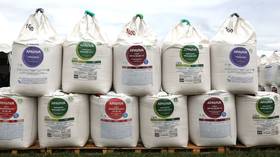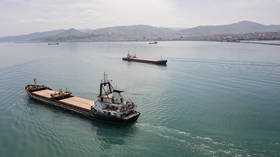Russia seeks more control over fertilizer sales – Bloomberg

Moscow is assessing the possibility of establishing a unified trading company for fertilizer exports, Bloomberg reported on Monday citing sources close to the discussions.
According to the report, the proposed move will unite Russian fertilizer exporters under one entity, which would give the country more sway in global pricing, while the government will gain more control over fertilizer export revenues.
The idea was reportedly pitched last month by Dmitry Mazepin, founder of Russian fertilizer giant Uralchem. Over the past month, the proposal has been discussed between major fertilizer producers, Deputy Prime Minister Denis Manturov and Prime Minister Mikhail Mishustin. However, some fertilizer makers did not support the proposal, worried that it could be harmful for their business, Bloomberg sources claimed. The talks are reportedly in their early stages, and no decisions have been made.
Uralchem’s press service denied any knowledge of the proposal. Government officials did not respond to media requests for comment.
Russia is the globe’s largest fertilizer producer, covering roughly 15% of global consumption. Russian fertilizer exports were not directly targeted by Western sanctions placed on Moscow in connection with the conflict in Ukraine. However, restrictions have still affected deliveries, which plunged 15% year-on-year in 2022.
For instance, Baltic ports have stopped handling most Russian fertilizer due to shipping and insurance restrictions, while several cargoes were blocked in ports across the EU.
The exit of global shipping companies, several international banks and insurers from Russia also contributed to difficulties faced by exporters.
However, according to official data, exports of most types of Russian fertilizers have been recovering this year amid successful efforts to reorient deliveries to Asia. The head of the Russian Fertilizer Producers Association (RAPU), Andrey Guryev, in May projected that exports may reach pre-sanctions levels of some 38 million tons by the end of the year. Russia’s average annual fertilizer output amounts to roughly 55 million tons.
For more stories on economy & finance visit RT's business section













